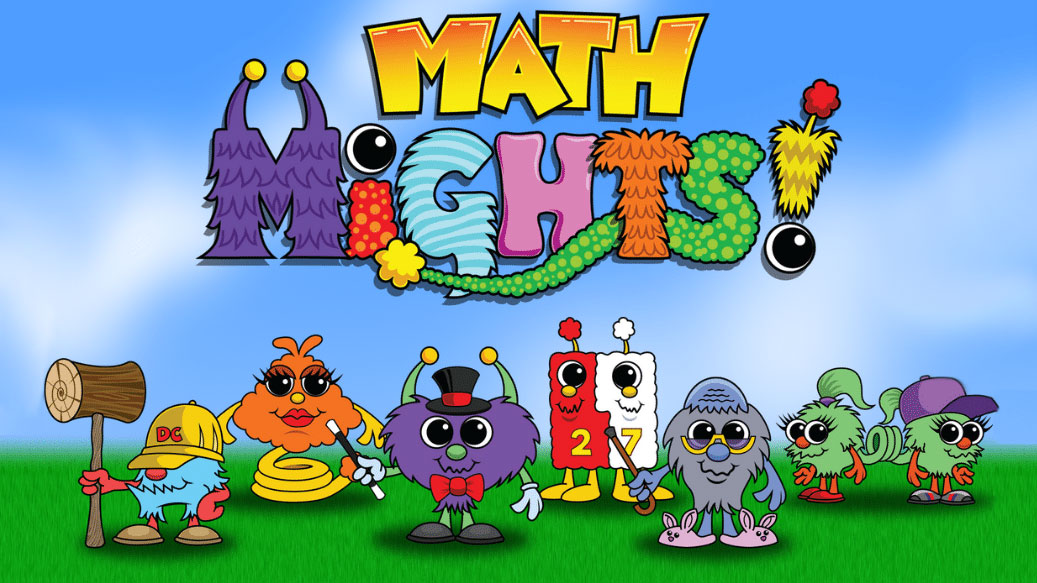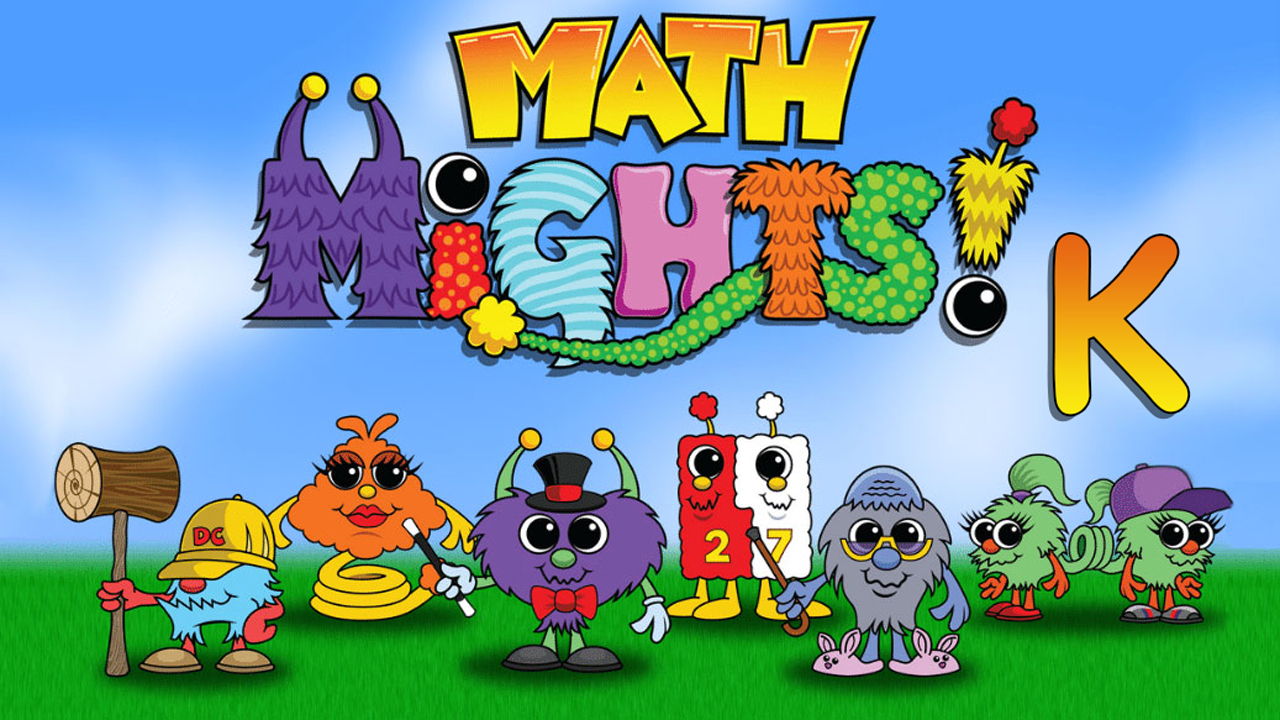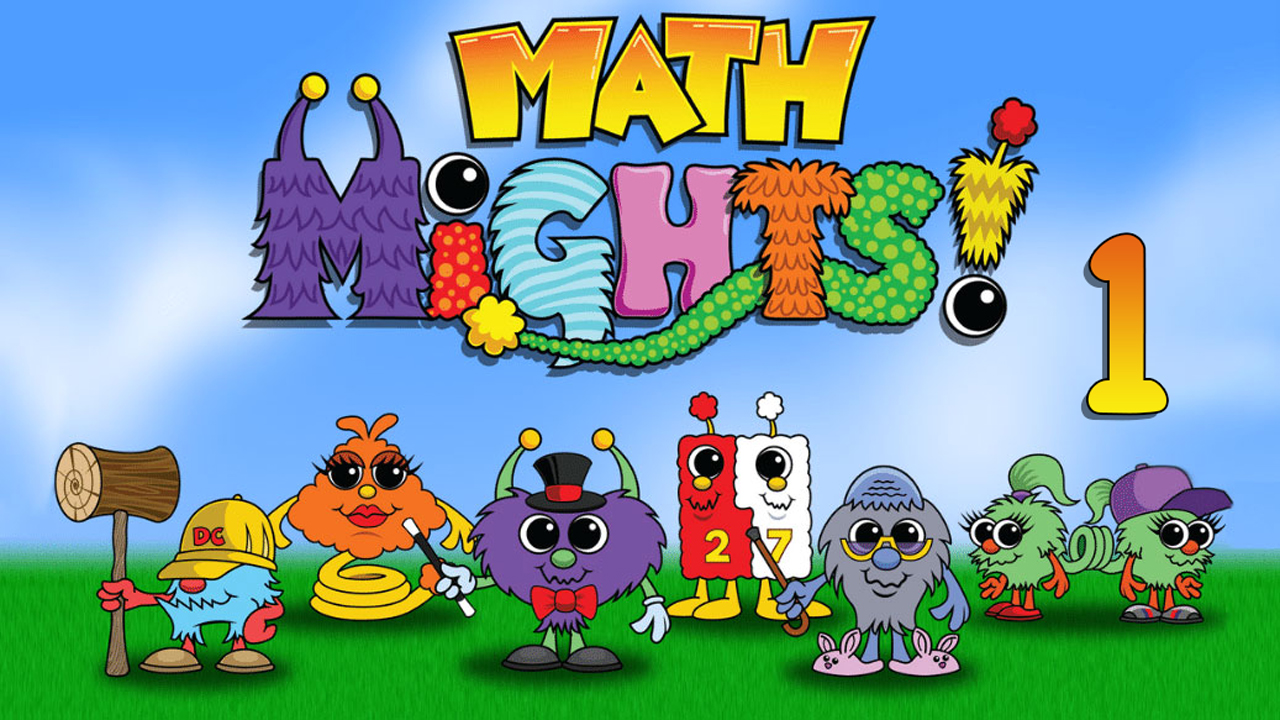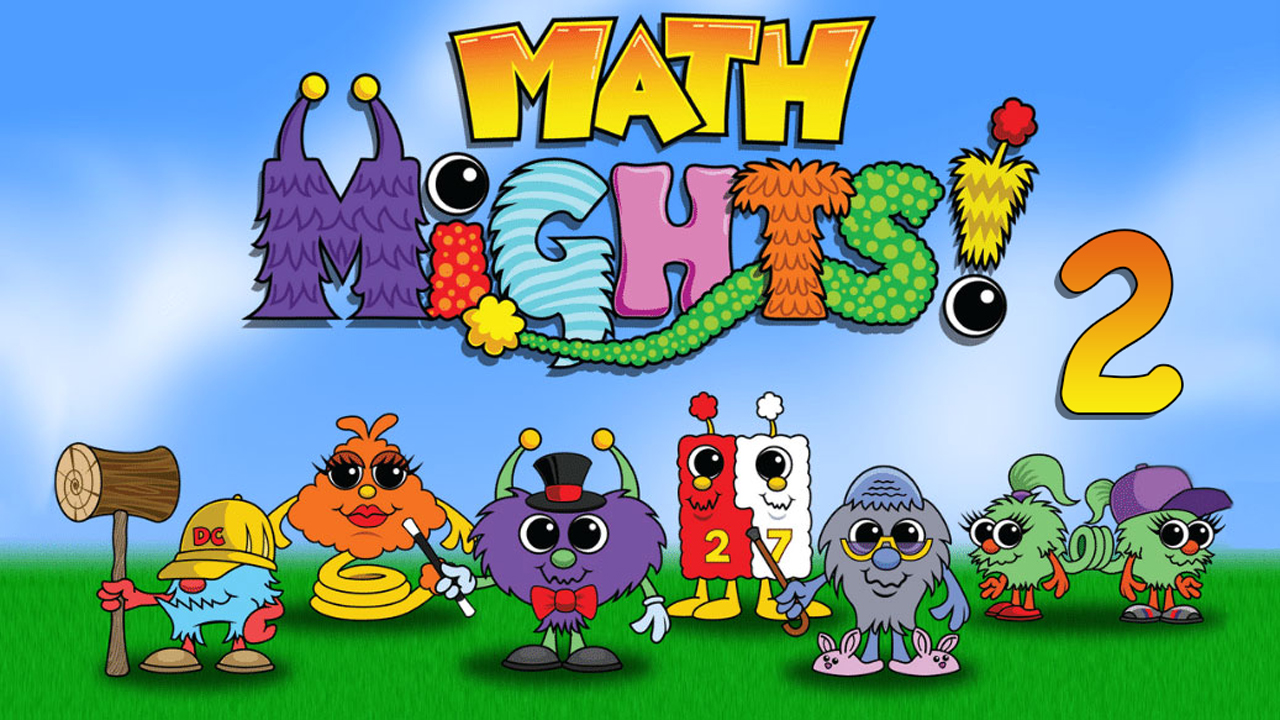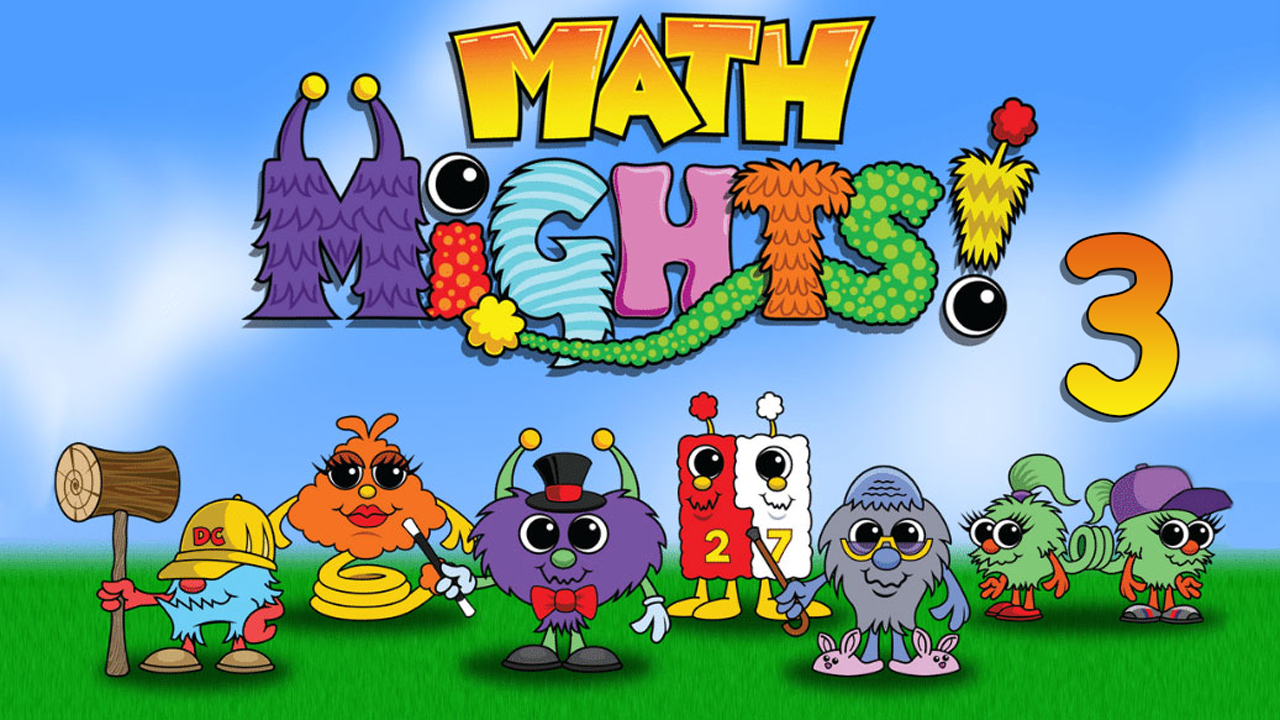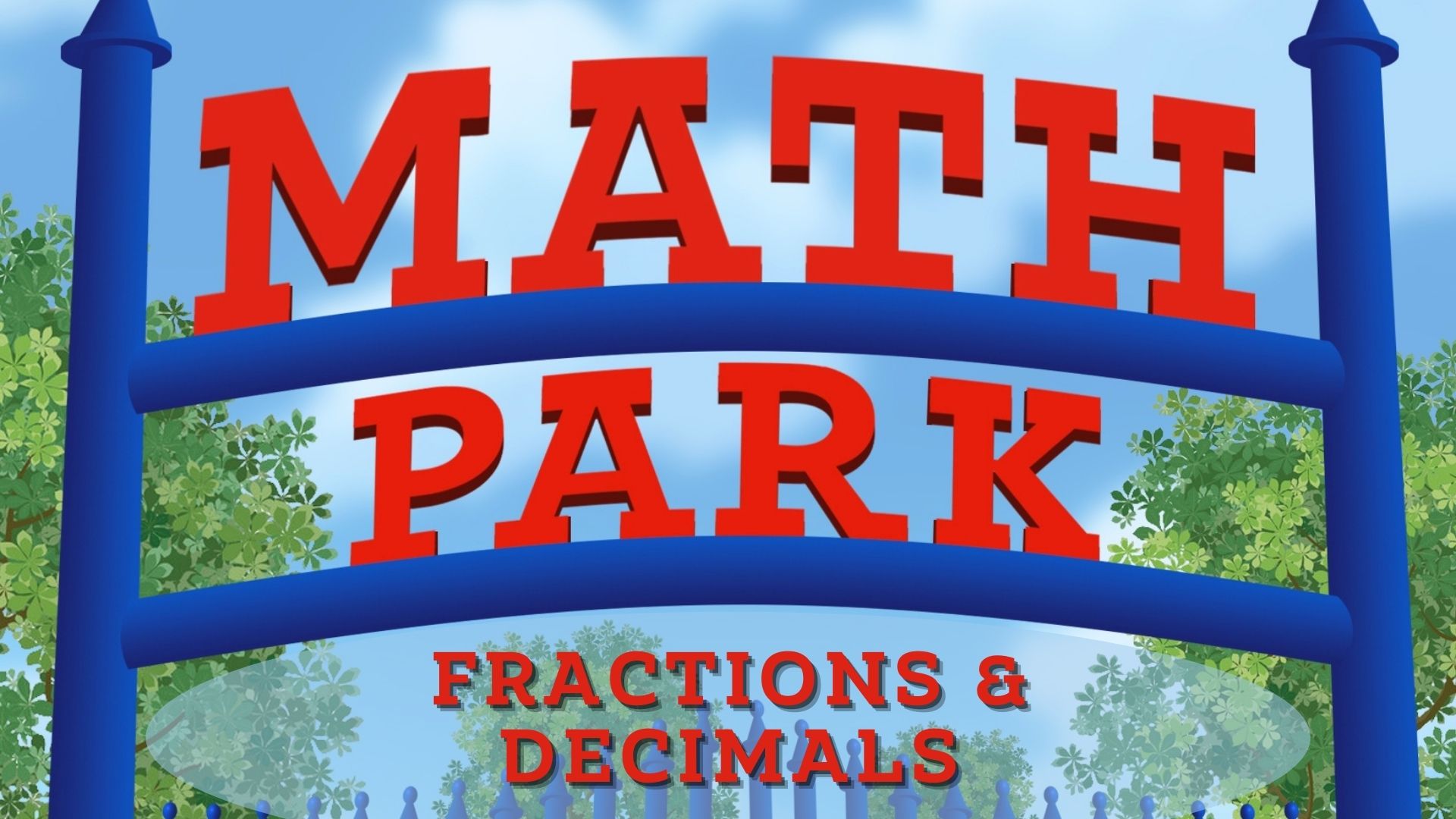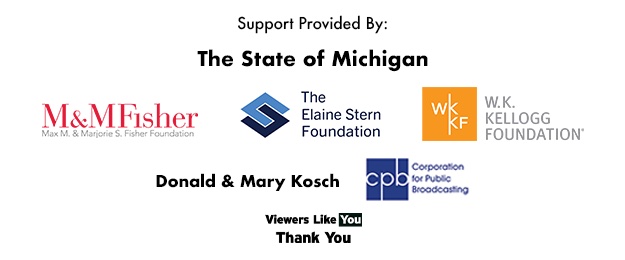Changing the Way Students Think About Math
Math Mights are a way to tie math strategies to characters that will help students understand math processes differently than just solving problems one way. This series promotes students’ communicated reasoning so they are able to confidently explain their thinking. It also provides a common language in schools so students can learn about the characters and the strategies in kindergarten and apply the same strategies to higher level concepts as they grow.
Visit MathMights.org for additional resources for each lesson and more information about the show.
Special Thanks for Math Mights
Math Mights was adapted from IM K-5 Math™ ©2021 by Illustrative Mathematics®, released under the Creative Commons Attribution 4.0 International License (CC BY 4.0) https://creativecommons.org/licenses/by/4.0/.
Additions and adaptations are ©2021 by Strategic Intervention Solutions, LLC
Math Mights Lessons
Warm up with a Mystery Math Mistake to tell whether Dotson's 10-frames represent a number more than his focus number. Examine a train to find shapes. Put together shapes to make familiar objects.
Warm up with a Mystery Math Mistake to add 9 and 5 using a double 10-frame and a decompose strategy. Use near-doubles to add with double 10-frames and a compensation strategy.
Warm up with a Mystery Math Mistake to find the mistake made in counting up on a number line to subtract. Use visual models to practice adding and subtracting lengths of objects within 100.
Warm up with a Mystery Math Mistake to hunt for the mistake made counting up on the number line. Use a Rekenrek and number line to explore rounding numbers to the nearest ten and hundred.
Warm up with a Mystery Math Mistake to tell whether Dotson's 10-frames represent a number less than his focus number. Tell Which One Doesn't Belong by examining four sets of pattern blocks. Use pattern blocks to make different shapes.
Warm up with a Mystery Math Mistake to find the error in DC's addition. Use different strategies to subtract including counting back and the connection between addition and subtraction. Use a number line to help count on to find a difference.
Warm up with a Mystery Math Mistake to find the mistake made in counting up on a number line to subtract. Notice and wonder to compare a bar graph and a line plot. Measure your own hand span. Create and use a line plot of hand span data to answer questions.
Warm up with a Mystery Math Mistake to hunt for the mistake made counting up on the number line. Use place value cards to practice rounding numbers to the nearest ten and hundred.
Warm up with a Mystery Math Mistake to build "one more." Hunt for different shapes within a picture. Describe and use attributes of shapes to tell if two shapes are the same. Match everyday objects with their shape.
Warm up with a Mystery Math Mistake to add 2 two-digit numbers. Measure the length of objects and sides of shapes in inches. Notice and Wonder to compare centimeters and inches. Find objects that are about 1 inch long.
Warm up with a Mystery Math Mistake to figure out what went wrong when adding two 3-digit numbers. Subtract within 1,000 using a number line and compensation and decompose strategies.
Warm up with a Mystery Math Mistake to order numbers. Explore 4 shapes: triangles, squares, rectangles, and circles. Go on a Shape Hunt to see how many shapes you can find in a picture. Use attributes of shapes to help reveal a mystery shape.
Warm up with a Mystery Math Mistake to compare expressions. Make a 10 to help you add. Use a double 10-frame and the "make 10" strategy to add two single-digit numbers.
Warm up with a Mystery Math Mistake to add 2 two-digit numbers. Explore how many inches there are in a foot. Practice picking the best unit, inches or feet, to measure the length of objects.
Warm up with a Mystery Math Mistake to find a mistake made in using an algorithm for addition and subtraction. Subtract within 1000 using strategies and algorithms based on place value, properties of operations, and/or the relationship between addition and subtraction.
Warm up with a Mystery Math Mistake as you add two 2-digit numbers using a decomposition strategy. What do you [...]
Use decomposition to find the area of figures. How will you decompose the figures into rectangles? Engage in a Number Talk and compare your strategies to others.
Decompose numbers to subtract. Engage in a Number Talk focused on subtraction strategies. Can you solve the problem without pencil and paper? Play a fun subtraction game called "Less than 10".
Explore area with square inches and centimeters. How can we use square inch tiles and centimeter cubes to compare the area of squares and rectangles? You'll also engage in a Number Talk focused on subtraction strategies.
Use the 10-frame to increase your number sense. Play fun games called "Deck o' Dot Duel 10-frame" and "Same, Less, More." Engage in a Number Talk to find "how many" and to answer a secret question.
Solve addition and subtraction word problems with a Step-by-Step Visual Model checklist. Understand what the problem is asking to help you solve it. Engage in a Number Talk to find "how many" and to answer a secret question.
Count up or down on an open number line. Explore a subtraction strategy and see if it helps you to subtract. Engage in a Number Talk.
Explore area with partially tiled rectangles. Can you apply what you know about multiplication to figure out the area of the rectangle? Discover lots of different units that we can use to measure area. Engage in a Number Talk and compare your strategies with others.
Figure out if there are enough. Engage in a Number Talk to find "how many" and to answer a secret question. Play a fun "4 in a row" game with numbers and arrangements.
Solve comparison word problems using data we get from questions like, Which meal is your favorite, breakfast, lunch or dinner? Play a game to use data to determine if a statement is true or false. Engage in a Number Talk to find "how many" and to answer a secret question.
Find area of figures with missing side lengths. How will you decompose the figures into rectangles to find the area? Engage in a Number Talk and compare your strategies with others.
Count birds to tell if Dotson made a Mystery Math Mistake when representing the number of birds using a 10-frame [...]
Represent 8 using a number bond and 10-frame to help solve a Mystery Math Mistake. Use Notice and Wonder to [...]
Warm up with a Mystery Math Mistake to hunt for the mistake in adding two 2-digit numbers using a decomposition [...]
Warm up with a Mystery Math Mistake as you add two 2-digit numbers using a decomposition strategy. Find Which One [...]
Count animals to tell if Dotson made a Mystery Math Mistake when representing the number of animals using a 10-frame [...]
Represent 10 using a number bond and 10-frame to help solve a Mystery Math Mistake. Use Notice and Wonder with [...]
Warm up with a Mystery Math Mistake as you add two 2-digit numbers using a decomposition strategy. Find Which One [...]
Warm up with a Mystery Math Mistake as you add two 2-digit numbers using a decomposition strategy. Use visual models [...]
Represent 6 with a 10-frame, dot card, and Rekenrek (counting buddy) to tell if Dotson made a Mystery Math Mistake. [...]
Represent 10 using a number bond and 10-frame with a missing addend. Use Notice and Wonder with a 10-frame, connecting [...]
Warm up with a Mystery Math Mistake as you add two 3-digit numbers using a partial sums strategy. Use strategies [...]
Use a 10-frame and Rekenrek (counting buddy) to tell if Dotson made a Mystery Math Mistake building "one less." Represent [...]
Represent a teen number using a number bond to solve a Mystery Math Mistake. Use Notice and Wonder with a [...]
Warm up with a Mystery Math Mistake as you add two 2-digit numbers using a decomposition strategy. Think through creating [...]
Warm up with a Mystery Math Mistake as you add two 3-digit numbers using a partial sums strategy. Use a [...]
Join Mrs. Gray for a Mystery Math Mistake with D.C. He needs your help with his number bonds. We will be counting pictures with ten and some more to answer the question "how many?"
Join Mrs. Gray for a Mystery Math Mistake with D.C. He needs help figuring out the missing parts in his number bonds. We represent numbers 11-19 in more than one way.
Join Mrs. Markavich with a Mystery Math Mistake - see if you can help D.C. with an addition mistake! We'll solve word problems with unknowns in different positions.
Join Mrs. Markavich with a Mystery Math Mistake - see if you can help D.C. and Value Pak with an addition mistake! We'll also solve word problems and write equations to match.
Join Mrs. McCartney for a Mystery Math Mistake - T-Pops needs your help with subtraction! We'll find different coin combinations to make 100 cents.
Join Mrs. McCartney for a Mystery Math Mistake - T-Pops needs your help with subtraction! We'll solve addition and subtraction story problems involving money.
Join Ms. Askew for a Mystery Math Mistake. Can you find her division mistake? We'll compare fractions with number lines!
Join Ms. Askew for a Mystery Math Mistake. Can you find her division mistake? We'll compare fractions that have the same numerator.
Join Mrs. Gray for a Numeracy Talk with Dotson working on the double ten frame. We compose numbers 11-19 using 10 ones and some more ones.
Join Mrs. Gray for a Numeracy Talk with Dotson working on the Counting Buddy Senior. We represent numbers with ten frames and dots or counters.
Join Mrs. Markavich for a number talk with Abracus as we work on compensation. We'll sort, describe and create solid shapes.
Join Mrs. Markavich for a number talk with Abracus as we work on compensation. We'll sort flat shapes and create a data display to represent our sort.
Join Mrs. McCartney for a Number Talk with Abracus as we work on Compensation. We'll compare numbers and add or subtract with Springling and T-Pops. I wonder who's strategy will be most efficient?
Join Mrs. McCartney for a Number Talk with Abracus as we work on compensation. We'll add or subtract tens or hundreds.
Join Ms. Askew for a fun Fraction Number Talk. We'll measure length in halves or quarters of an inch.
Join Ms. Askew for a fun Fraction Number Talk. We'll measure length using a ruler marked with halves and quarters of an inch.
Join Mrs. Gray for a Numeracy Talk with Dotson seeing the Counting Buddy Senior but building what we saw on a double ten frame. We also show numbers 11-19 in different ways.
Join Mrs. Gray for a Numeracy Talk with Dotson seeing the double ten frame but building what we saw using a Rekenrek. We work with numbers 11-19 and write equations.
Join Mrs. Markavich for a number talk with D.C. as we work on decomposing and composing to make a 10. We'll also explore what makes a shape a triangle, a rectangle, or a square.
Join Mrs. Markavich for a number talk with D.C. as we work on decomposing and composing to make 10. We'll build a new shape from smaller shapes.
Join Mrs. McCartney for a Number Talk with Value Pak as we work on partial sums. We'll find the difference between numbers with Springling.
Join Mrs. McCartney for a Number Talk with D.C. and Value Pak. We'll add and subtract three-digit numbers with Springling and Minni and Subbi.
Join Ms. Askew for a fun Fraction Number Talk Sort. We'll also make sense of line plots with lengths in halves and quarter inches.
Join Ms. Askew for a fun Fraction Number Talk Sort. We'll have fun collecting data and creating our own line plot to represent our data.
Join Ms. Askew for a Mystery Math Mistake. Can you find her subtraction mistake? Next we'll use number lines to learn more about fractions that are whole numbers!
Join Mrs. Gray for a Mystery Math Mistake with D.C. He needs help figuring out his number bonds to match ten frames. We are going to have fun figuring out how many objects are in our collections.
Join Mrs. Gray for a Mystery Math Mistake with D.C. He needs help figuring out his number sentences to match ten frames. We are going to work on answering questions about how many are in groups of up to 20.
Join Mrs. Markavich with a Mystery Math Mistake - see if you can help Professor Barble with his word problem error! We'll also solve measurement word problems and compare lengths.
Join Mrs. Markavich with a Mystery Math Mistake - see if you can help Professor Barble with his word problem. We'll also solve measurement word problems and comparie lengths.
Join Mrs. McCartney for a Mystery Math Mistake - T-Pops needs your help! We'll learn about coins and their values.
Join Mrs. McCartney for a Mystery Math Mistake - T-Pops needs your help! We'll learn about coins and their values as we combine them in different ways.
Join Ms. Askew for a Mystery Math Mistake. Can you find her division mistake? We'll use number lines, fraction strips, and area models to find equivalent fractions!
Join Ms. Askew for a Mystery Math Mistake. Can you find her division mistake? D.C is going to help us understand how to decompose fractions to make a whole number!
Join Mrs. Gray for a subtraction word problem with Professor Barble! Next, get ready for some fun with using D.C. to find ALL the ways to break apart numbers.
Join Mrs. Gray for a subtraction word problem with Professor Barble! We are going to have some fun doing word problems with 2 parts. We will learn together why labeling word problems help us to understand what the problem is asking.
Join Mrs. Markavich for a subtraction word problem with Professor Barble. Next, get ready to make sense of equations that have a missing part and look out for D.C. as we make a ten to solve addition easier!
Join Mrs. Markavich for a missing addend word problem with Professor Barble. Next, we are going to look closely at addition problems to see when we make a new ten or when we don't. You will be an expert and looking carefully at addition problems!
Join Mrs. McCartney for some fun with Professor Barble doing a tricky comparison word problem. Next, we are going to explore triangles, quadrilaterals, pentagons, hexagons by sorting and naming a variety of shapes.
Join Mrs. McCartney for a word problem with Professor Barble that will make more sense with a visual model. Get ready to have fun using attributes like sides, corners, side lengths and square corners to create shapes!
Join Ms. Askew for a division word problem with her friend Professor Barble. Next, get ready to start to explore fractions by learning about partitioning parts of a whole!
Join Ms. Askew for a division word problem with her friend Professor Barble. Next, to see if you use fraction language to describe fractions (partition, equal parts halves, thirds). Then we are going to create fraction strips together so you have a tool to use while learning fractions!
Join Mrs. Gray for a subtraction word problem with Porfessor Barble! We are going to take word problems to a new level with putting together and taking apart with both addends unknown. I wonder if you will be able to come up with ALL of the ways to solve!
Join Mrs. Gray for a subtraction word problem with Porfessor Barble! Get ready to solve word problems more than one way. You will discover a pattern to help you understand word problems that can have multiple answers!
Join Mrs. Markavich for a missing addend word problem with Professor Barble! Look out for two of our Math Might friends D.C. and Value Pak as they help us learn to add two-digit number in more than one way!
Join Mrs. Markavich for a missing addend word problem with Professor Barble! Next we are going to spend some quality time with Value Pak as we learn to add by adding tens-and-tens then ones-and-ones!
Join Mrs. McCartney for some fun with Professor Barble doing a tricky comparison word problem. Next we are going to explore 3D shapes by identifying and describing their attributes. We will even show you how to create a 3D shape with paper!
Join Mrs. McCartney for some fun with Professor Barble doing a tricky comparison word problem. Next we are going have some fun with pattern blocks composing different shapes. How many ways can you make a hexagon?
Join Ms. Askew for a tricky multi-step word problem with Professor Barble! Next we are going to explore non-unit fractions by looking at shaded parts, sizes of each part and finding the fraction represented in shaded parts.
Join Ms. Askew for another multi-step word problem with Professor Barble! Next we will build fractions from unit fractions and play a fun game called Secret Fractions!
Join Mrs. Gray for a Mystery Math Mistake word problem. Get ready to have fun with 10 frames matching equations to compositions and decompositions of 10.
Join Mrs. Gray for Mystery Math Mistake word problem. Get ready to have fun with 10 frames by playing Shake Those Discs and figuring how many more are needed to make 10.
Join Mrs. Markavich for a Mystery Math Mistake with Value Pak - they need your help! Next, start to compare and order objects by length.
Join Mrs. Markavich for a Mystery Math Mistake with Value Pak, they need your help! Next, explore measuring by choosing objects to indirectly compare.
Join Mrs. McCartney for a Mystery Math Mistake. Can you help D.C. fix his problem? Next, explore fractions by partitioning rectangles and circles into halves, fourths and thirds.
Join Mrs. McCartney for a Mystery Math Mistake. Can you help D.C. fix his problem? Next, make halves, thirds, fourths in different ways and discover a whole.
Join Ms. Askew for a Mystery Math Mistake. Can you find her multiplication mistake? Next we'll use number lines to learn more about fractions!
Join Ms. Askew for a Mystery Math Mistake. Can you find her multiplication mistake? Next we'll use number lines to learn more about fractions!
Join Mrs. Gray for a Mystery Math Mistake! I wonder if she made a mistake in her drawing? Pack your bags - we're going camping! We'll see 10 friends, but some will be hiding in the tent. Can you figure out how many friends are hiding?
Join Mrs. Markavich with a Mystery Math Mistake - see if you can help D.C. with his strategy! Next, can you help us measure with different units (small and large paper clips, connecting cubes and small cubes)?
Join Mrs. McCartney for a Mystery Math Mistake - Springling needs your help! Next, apply your knowledge of fractions to tell time by using half past, quarter till and quarter after.
Join Mrs. McCartney for a Mystery Math Mistake -Springling needs your help! Get ready to have fun telling time with analog and digital clocks in five minute intervals and using A.M. and P.M.
Join Ms. Askew for a Mystery Math Mistake. Springlinng needs your help! Next we'll partition, locate and label non-unit fractions on number lines!
Join Mrs. Gray for a word problem with Professor Barble! Next, get ready to have some fun with pattern block designs as we match expressions to two parts.
Join Mrs. Gray for a word problem with Professor Barble! Get your mallet ready to work with D.C. as we decompose and compose numbers with snap cube trains!
Join Mrs. Markavich for a word problem with her friend Professor Barble! Next, get ready to have some fun with Value Pak as we add 2-digit numbers using base ten strategies!
Join Mrs Markavich with a part-whole missing addend word problem with her friend Professor Barble. Next, get ready to have some fun with D.C. adding 2 digit-numbers to a 1 digit number by making a friendly decade number!
Join Mrs. McCartney to learn how to do a comparison word problem with Professor Barble! Next, we are going to work on comparing 3 Digit numbers with a game of true and false! Plus we will use numberline, Value Pak, Place Value discs and blocks to compare! Which tool will you pick to use?
Join Mrs. McCartney for a comparison word problem with her friend Professor Barble. Next, get ready to order 3-digit numbers using place value understanding. We will be using number lines and Value Pak to help apply our thinking.
Join Ms. Askew and Professor Barble to do a visual model with a word problem. Next, watch out for Springling as she is going to help us understand how to use the strategy of multiplying-up to divide.
Join Ms. Askew and Professor Barble to do a visual model with a multiplication a word problem. Get ready to divide within 100, where the quotient or divisor is higher than 20.
Join Mrs. Gray for a word problem with Professor Barble! Next, get your mallet ready to decompose and compose numbers up to 5 with D.C.
Join Mrs. Gray for a word problem with Professor Barble! Next, get ready to have some fun with pattern block designs as we match expressions to two parts.
Join Mrs. Markavich for a word problem with her friend Professor Barble! Get ready to have some fun adding tens and ones with ten frames and with a game called "What did I Add"!
Join Mrs. Markavich for a word problem with her friend Professor Barble! Next, we will work on adding two-digit numbers and matching equations!
Join Mrs. McCartney for a word problem with Professor Barble using Visual Models! Next great ready to locate and compare 3-digit numbers on a number line! We may even see our friend Value Pak to help us!
Join Mrs. McCartney to go on a mission to see if we can figure out Professor Barble's comparison word problem. Next, get ready for some fun with Value Pak and Base-Ten blocks as we compare 3-Digit Numbers
Join Ms. Askew and Professor Barble to see if you can match visual models to word problems. Get ready to put your thinking cap on as we work on division with larger numbers within word problems. How many strategies do you have for division?
Join Ms. Askew and Professor Barble to see if you can match visual models to word problems. Next, we are going to represent division with base ten blocks!
Join Mrs. Gray to talk about numbers with the Counting Buddy Junior. Then get ready to match fun story problems with the correct addition or subtraction expression!
Join Mrs. Gray & Dotson to talk about numbers with My Counting Buddy Junior. Next, we are going to have so much fun playing a game together by matching the drawing to the expression.
Join Mrs. Markavich & Dotson for a Numeracy Talk with the Counting Buddy Senior, then we show you different ways to decompose and compose 2-digit numbers!
Join Mrs. Markavich & Dotson to talk about numbers with the Counting Buddy Senior! Get ready for Value Pak to show you how different ways to compare 2-digit numbers!
Join Mrs. McCartney to talk about numbers with Springling! Then watch out for the Value Pak as we have fun with putting numbers together and taking them apart with the expanded form!
Join Mrs. McCartney to talk about numbers with Springling! Then be ready to take on the challenge of representing numbers in different ways to show off your learning with place value!
Join Ms. Askew to talk about numbers with her Math Mights friends, and then learn about multiplying one-digit whole numbers by multiples of 10.
Join Ms. Askew to talk about numbers with her Math Mights friends. Next, she is going to help you take multiplication to a whole new level as we multiply numbers larger than 20!
Join Mrs. Markavich & Dotson for a Numeracy Talk with the Counting Buddy Senior! Let's learn together about "greater than", "less than" and "equal to"!
Join Mrs, McCartney for a Number Talk with her friend Springling! Be ready to build 3-digit numbers in different ways with base ten blocks and place value discs.
Join Mrs. Askew for a Number talk with 2 Math Might Friends! Then let's solve some problems with equal groups that have larger numbers!
Join Mrs Gray & Dotson for a Numeracy Talk with My Counting Buddy Junior! Get ready to have some fun with comparing addition and subtraction word problems!
Join Mrs. Markavich & Dotson for a Numeracy Talk with the Counting Buddy Senior! Let's learn together about "greater than", "less than" and "equal to"!
Join Mrs, McCartney for a Number Talk with her friend Springling! Next get ready to have some fun with base ten blocks and place value discs to represent 100s different ways
Join Mrs. Askew for a Number Talk with 2 Math Might Friends! Then get ready to have D.C. help us represent multiplication with teen numbers!
Join Mrs. Gray & Dotson for a Numeracy Talk with My Counting Buddy Junior! Next be ready to have some fun playing Trash Can Subtraction and modeling subtraction word problems!
Join Mrs. Gray for Numeracy Talk with Dotson working on conservation to 10. Get your addition brain ready as we will have some fun with object to show how to do addition word problems to 10.
Join Mrs. Gray for Numeracy Talk with Dotson working on conservation to 10. Get your math brain ready as we will have some fun with quick draws to show how to do addition word problems to 10.
Join Mrs. Markavich for Numeracy Talk with Dotson working on conservation to 20. Get your math brain ready to have some fun with adding two-digit numbers.
Join Mrs. Markavich for Numeracy Talk with Dotson working on conservation to 20. Get ready to have some fun with ten more, ten less.
Join Mrs. McCartney for an addition number talk with D.C.! Get your math brain ready as we meet T-Pops and have some fun subtracting two-digit numbers.
Join Mrs. McCartney for an addition number talk with D.C.! Get ready to have some fun subtracting two-digit numbers with regrouping and renaming.
Join Ms. Askew for a subtraction number talk with Springling! Get ready to have some fun with relating division to multiplication.
Join Ms. Askew for a subtraction number talk with Springling! Get ready to learn how you can quickly multiply and divide by relating multiplication and division.
Join Mrs. Markavich for Numeracy Talk with Dotson working on conservation to 20. Get ready to have some fun with identifying tens and ones with Value Pak!
Join Mrs. McCartney for an addition number talk with D.C.! Get your hopping skills ready so you can meet our Math Might friend Springling to hop forward or back on the numberline to subtract.
Join Ms. Askew for a subtraction number talk with Springling! Get your multiplication brain ready as you learn how to say "group of" instead of "times".
Join Mrs. Gray for Numeracy Talk with Dotson working on conservation to 10. Get your imagination ready as we will have some fun with objects to show how to do addition word problems to 10.
Join Mrs. Markavich for Numeracy Talk with Dotson working on conservation to 20. Get your math brain ready to have some fun with identifying tens and ones with Value Pak!
Join Mrs. McCartney for an addition number talk with D.C.! Get your hopping skills ready so you can see our Math Might friend Springling to hop forward or back on the numberline to subtract.
Join Ms. Askew for a subtraction number talk with Springling! Get your math brain ready as we learn to divide one group into smaller groups.
Join Mrs. Gray for Numeracy Talk with Dotson working on conservation to 10. Get your imagination ready as we will have some fun with objects to show how to do subtraction word problems to 10.

